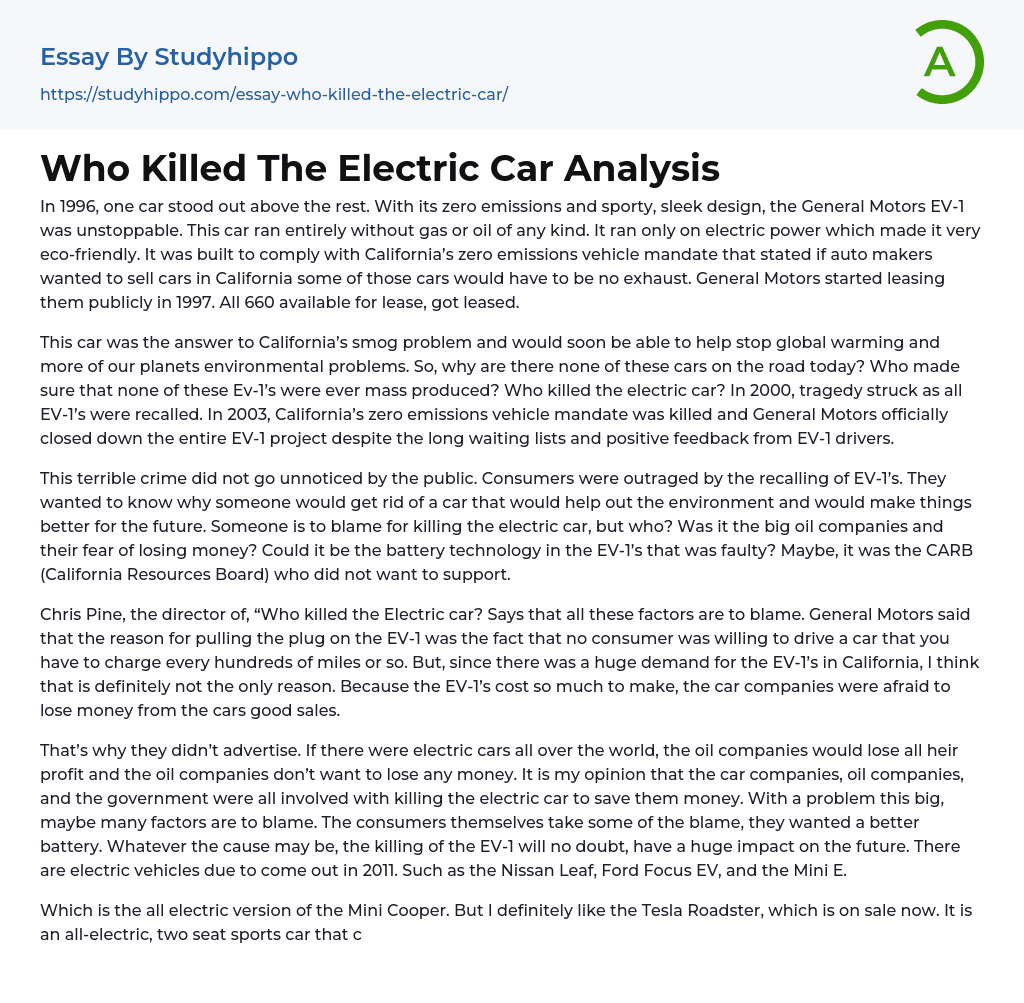Back in 1996, a particular car outshined all others. The General Motors EV-1, with its zero-emission feature and attractive, streamlined design was unrivaled. Operating without the need for gas or oil, this car's only power source was electricity, making it extremely environmentally friendly. In line with California's zero-emissions vehicle policy which required automakers to offer some emission-free cars if they wanted to sell in the state, this vehicle was designed. It became publicly available for lease by General Motors in 1997 and all of the 660 cars offered for lease were snapped up.
This vehicle was a solution to the pollution issues in California and was poised to assist in curbing global warming as well as numerous other environmental challenges on our planet. Nonetheless, why aren't these vehicles present on our streets today? Who ensured that these EV-
...1s never went into large-scale production? Who put an end to the electric vehicle? In the year 2000, a calamity occurred when all EV-1s were summoned for recall. In 2003, California's mandate for zero-emission vehicles was eliminated and General Motors formally terminated the entire EV-1 venture, despite the lengthy waiting lists and positive reviews from EV-1 owners.
The horrendous act of EV-1's recall did not escape public scrutiny. The decision to withdraw a car that promised environmental benefits and improved future prospects sparked outrage among consumers. They craved answers as to why anyone would dismiss such a potent solution. A scapegoat must surely exist behind the death of the electric car, but who could that be? Could it be the major oil corporations worried about potential financial losses? Or was it due to defective battery technology within the EV-1's?
Perhaps, the CARB (California Resources Board) refrained from lending its support.
Chris Pine, the director of "Who killed the Electric car?", contends that numerous elements are at fault. General Motors attributes the discontinuation of the EV-1 primarily to insufficient consumer interest in a vehicle needing charging after every couple hundred miles. Yet, considering the significant demand for this model in California, it doesn't seem plausible that this is the only reason. The elevated production cost of EV-1 also invoked worries among automobile manufacturers regarding possible financial losses, notwithstanding its robust sales.
The reason for not promoting is the fear of a financial drain faced by the oil companies if electric vehicles were globally ubiquitous. It's almost apparent that automobile companies, oil corporations, and the government conspired against the expansion of electric cars to safeguard their resources. In such a profound issue, it's plausible that numerous aspects are culpable. Notably, customers who demanded improved batteries are also partially responsible. Regardless of the actual reasons, the discontinuation of the EV-1 will undeniably leave a large footprint on future prospects. Several electric models like Nissan Leaf, Ford Focus EV, and Mini E are anticipated to roll out in 2011.
Which specific electric variant of the Mini Cooper are we discussing? Personally, I'm an admirer of the currently available Tesla Roadster. This fully electric high-performance sports car has room for two and boasts impressive speed capabilities, reaching 60 mph in under 4 seconds. Its mileage is equally noteworthy; it can travel around 245 miles on a single charge that takes about 3.5 hours. In contrast, both the Leaf and Focus EV have a range limit of roughly 100 miles and need about
8 hours to achieve a full charge, making the Roadster distinctly superior. Whether an electric vehicle fits your needs may hinge on the distances you typically cover and your readiness to make lifestyle changes for environmental preservation.
Beyond just electric cars, viable options also encompass Hybrid Electric Vehicles (HEV) and Plug-in Hybrids (PHEV). These kinds of hybrid autos come fitted with an internal combustion engine along with an electric propulsion system to enhance fuel economy. They incorporate advanced technologies such as regenerative braking that converts kinetic energy generated during braking into electrical power for refuelling the vehicle battery. Furthermore, these vehicles feature a start-stop mechanism that shuts down the internal combustion engine while the car is idling at traffic signals, thus saving fuel.
A PHEV, or plug-in hybrid vehicle, is fitted with rechargeable batteries that can be entirely powered up using a standard wall outlet. Does this suggest they are the final answer? Given the looming scarcity of worldwide oil supplies, it appears improbable. Still, we must not overlook the importance of hybrid technology. I am keenly anticipating progress in Honda and Toyota's hydrogen fuel cell innovations for cars. I'm convinced that there will be an urgent demand for fuel cells and purely electric vehicles in times to come.
- Energy Development essays
- The elements essays
- Voltage essays
- Solar Energy essays
- Nuclear Energy essays
- Alternative Energy essays
- Cars essays
- Bicycle essays
- Rms Titanic essays
- Renault essays
- Truck essays
- chrysler essays
- The city essays
- Racing essays
- Automobile essays
- Bus essays
- Civil engineering essays
- Cycling essays
- Electric Car essays
- Genetic Engineering essays
- Hybrid essays
- Innovation essays
- Internal Combustion Engine essays
- Invention essays
- Mechanical Engineering essays
- Mechanics essays
- Software Engineering essays
- Telephone essays
- Atom essays
- Big Bang Theory essays
- Density essays
- Electricity essays
- Energy essays
- Force essays
- Heat essays
- Light essays
- Motion essays
- Nuclear Power essays
- Physiology essays
- Sound essays
- Speed essays
- Temperature essays
- Thermodynamics essays
- Adaptation essays
- Adventure essays
- Adversity essays
- Aging essays
- Alcohol essays
- Barbie Doll essays
- Beauty essays




